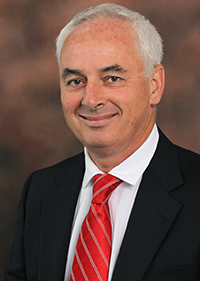
 Dr. Peter F. Buckley became the 26th Dean of the Medical College of Georgia at Augusta University in 2011. A psychiatrist and expert in schizophrenia, Dr. Buckley also is a Professor of Psychiatry, Pharmacology and Radiology at MCG.
Dr. Peter F. Buckley became the 26th Dean of the Medical College of Georgia at Augusta University in 2011. A psychiatrist and expert in schizophrenia, Dr. Buckley also is a Professor of Psychiatry, Pharmacology and Radiology at MCG.
Dr. Buckley joined the faculty of the state’s public medical school in 2000 as Chair of the Department of Psychiatry and Health Behavior. From 2007 to 2010, he also served as Associate Dean and then as Senior Associate Dean for Leadership Development in the medical school. His previous academic appointments include serving as Professor and Vice Chair of the Department of Psychiatry at Case Western Reserve University, School of Medicine, Cleveland. In 1994, Dr. Buckley also became Medical Director of Western Reserve Psychiatric Hospital, a role that expanded over time to include serving as Medical Director for Northcoast Behavioral Healthcare System, which included three state inpatient psychiatric facilities in Cleveland and Toledo, Ohio. Dr. Buckley also served as Co-Director of the statewide community service product line for the Ohio Department of Mental Health.
Currently, Dr. Buckley serves as a Council of Deans liaison to the Association of the American Medical Colleges Group on Resident Affairs. He is a Distinguished Fellow of the American Psychiatric Association and served on the association’s Workgroup on the Role of Psychiatry in Healthcare Reform. He is also a Fellow of the Royal College of Psychiatrists and served as Chair of the Pan American Division. Dr. Buckley is past President of the American Association of Chairs of Departments of Psychiatry. He serves as a member of the Data Safety & Monitoring Board of the National Institute of Mental Health. He is former Chair of the NIMH Interventions Committee for Disorders Related to Schizophrenia, Late Life, or Personality, and regularly serves as Chair for various NIMH Special Emphasis Panels. He is a member of the Executive Committee of the International Congress of Schizophrenia Research and President of the Richmond County Medical Society.
Dr. Buckley has published more than 350 original articles, book chapters, and abstracts. He is senior author of a postgraduate textbook of psychiatry. Dr. Buckley has also authored or edited 12 books on schizophrenia and related topics in psychiatry. He is Editor of the journal Clinical Schizophrenia & Related Psychoses and was the inaugural Editor of the Journal of Dual Diagnosis. He also is Associate Editor of the Journal of Nervous and Mental Diseases, a member of the Editorial Boards of nine other psychiatric journals, and has served as a reviewer for over 60 journals. Dr. Buckley's research predominantly focuses on the neurobiology and treatment of schizophrenia, including current studies on the genetics of schizophrenia and on the psychopharmacology of relapse in schizophrenia. He has also conducted research on Patient and Family Centered Care and on the development of academic leadership.
For his transdisciplinary work on State-University collaborations, Dr. Buckley received the American Psychiatric Association Administrative Psychiatric Award (2004). He is also the recipient of an Exemplary Psychiatrist Award from the National Alliance for Mental Illness (1998), the Lilly Schizophrenia Reintegration Award (1999), the Georgia Psychiatrist of the Year Award (2006); the Wayne Fenton Award for Exceptional Clinical Care (2011): the Cancro Academic Leadership Award from the American Academy of Child and Adolescent Psychiatry (2012); the American Psychiatric Association Special Presidential Commendation for leadership (2013); and the Lamartine Hardman Cup for exemplary physician leadership from the Medical Association of Georgia (2013) In 2012, he and his colleagues received the prestigious ‘Creativity in Psychiatric Education’ award from the American College of Psychiatrists. He has been continuously acknowledged since 2002 in "The Best Doctors in America.”
Dr. Buckley received his medical degree from the University College Dublin School of Medicine in Ireland, where he also completed psychiatric residency training followed by a fellowship in schizophrenia research. He subsequently obtained a master’s degree by thesis (1996) from University College Dublin.
RELATED VIDEO












